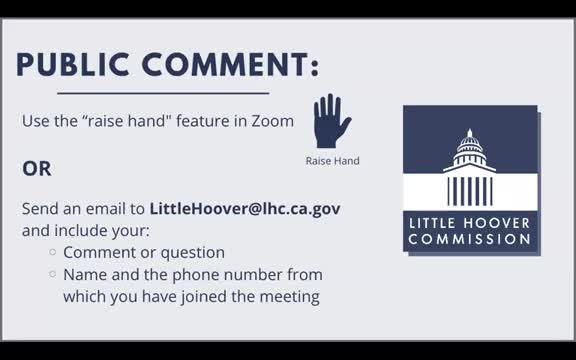California's Energy Efficiency Programs Reduce Rates and Support 300000 Jobs
July 26, 2025 | Little Hoover Commission, Other State Agencies, Executive, California
Thanks to Scribe from Workplace AI and Family Portal , all articles about California are free for you to enjoy throughout 2025!

This article was created by AI using a video recording of the meeting. It summarizes the key points discussed, but for full details and context, please refer to the video of the full meeting. Link to Full Meeting
A key point raised during the discussions was the declining percentage of revenue from EE programs on customer bills. According to the California Public Utilities Commission (CPUC), this figure dropped from 2.2% in 2023 to 1.5% in 2024, despite a significant increase in the overall revenue requirement for utilities, which rose from $39 billion to $44 billion. This trend suggests that EE programs are not contributing to rising electricity costs, countering concerns that such initiatives might inflate rates.
Moreover, EE programs are recognized as a major source of employment within California's energy sector, supporting over 300,000 jobs. These positions, often linked to small businesses, provide long-term career stability and are essential for the ongoing effort to decarbonize homes and businesses across the state. The meeting underscored that as federal policies shift away from clean energy, the value of energy saved through EE initiatives will likely increase, making these programs even more vital in addressing the state's affordability crisis.
David Ortiz from the Energy Transition Collective also spoke about Senate Bill 647, which aims to enhance oversight for low-income energy programs. This legislation seeks to ensure that clean energy upgrades are accessible to low-income Californians, emphasizing health, comfort, and safety alongside energy savings. Ortiz argued that the bill would not increase costs for customers and is crucial for protecting vulnerable populations from potential rate hikes.
The discussions at the meeting reflect a broader commitment to balancing energy efficiency, affordability, and job creation in California's energy landscape. As the state navigates challenges related to energy costs and federal policy changes, the emphasis on robust EE programs and equitable access to clean energy resources will be essential for fostering a sustainable and inclusive energy future. The commission's ongoing work will likely focus on these themes, ensuring that California's energy policies continue to support both economic and environmental goals.
Converted from Hearing on California Electricity Costs (Part 4) - July 24, 2025 meeting on July 26, 2025
Link to Full Meeting
Comments
View full meeting
This article is based on a recent meeting—watch the full video and explore the complete transcript for deeper insights into the discussion.
View full meeting
